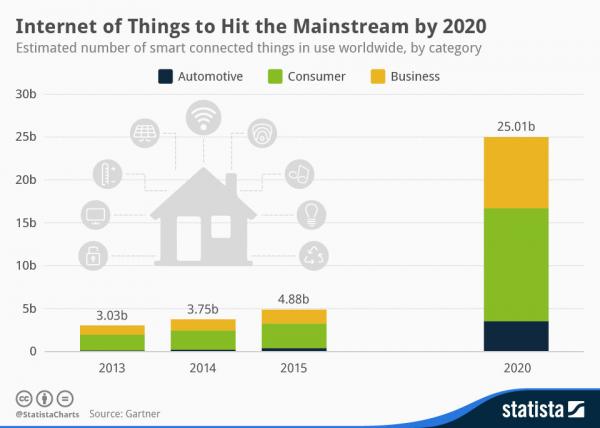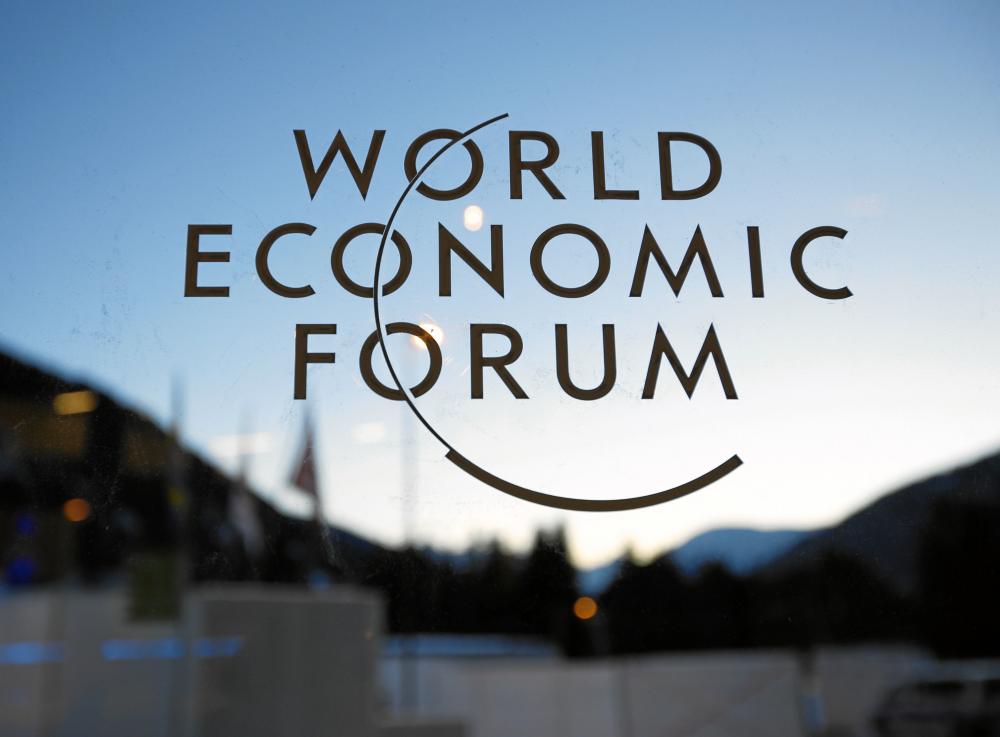The Davos World Economic Forum Annual Meeting is taking place this weekend in Switzerland, where people from all over the world gather to discuss technologies, and what kind of impact they have on the world, as well as what agenda and collaborative activities can help shape it in a creative manner.
While the full rundown of events, speakers and other panels can be found on the official page here, here’s a brief overview with some notes that may be of interest to marketers and companies:
The Internet of Things is here
Davos estimates that by 2020 50 billion devices will be connected with one another. A report from the McKinsey Institute also suggests that by 2025 the potential economic impact of having “sensors and actuators connected by networks to computing systems” could reach a whopping $11 trillion yearly.
The chart below shows just what kind of growth we’re in for. Right now, the numbers may not look very high, but there are nearly five billion devices currently connected – and it will grow over five times in just a few years time.
 That said, there are challenges to consider, as some companies are still looking to tap the true potential of IoT. However, in the end, the general idea is that such devices will provide a better understanding of how the world works, and can strengthen through innovations.
That said, there are challenges to consider, as some companies are still looking to tap the true potential of IoT. However, in the end, the general idea is that such devices will provide a better understanding of how the world works, and can strengthen through innovations.
The digital transformation of industries
With this particular panel, there were several subjects on the agenda, including defining digital transformation, making the right investment decisions and designing a digital culture.
The Forum’s Fulvia Montresor, head of technology pioneers, had plenty to say on the matter,pointing out seven different technologies that could change the way some companies look at business. “From intelligent robots and self-driving cars to gene editing and 3D printing, dramatic technological change is happening at lightning speed all around us.”
The Fourth Industrial Revolution is being driven by a staggering range of new technologies that are blurring the boundaries between people, the internet and the physical world. It’s a convergence of the digital, physical and biological spheres.
It’s a transformation in the way we live, work and relate to one another in the coming years, affecting entire industries and economies, and even challenging our notion of what it means to be human.”
Innovation is coming at a rapid pace, according to panel member Marc Benioff, and that’s something companies can take advantage of as far as technology is concerned. He also notedthe following: “Breakthroughs in artificial intelligence, quantum computing, robotics, clean energy, genetic engineering and other fields have the potential to profoundly reshape manufacturing, agriculture, medicine and more. Business leaders everywhere are trying to keep up with this immense wave of digital transformation.”
Other factors that were discussed during the panel include introducing innovations through business technology, creating possibilities for new customers (with minimal effort, in some cases) and even trust, as Benioff noted. “The Fourth Industrial Revolution starts with one very important point: trust. You are about to define a new level of trust between yourself and your employees, yourself and your customers, yourself, your shareholders, and yourself and your partners. This is a cultural revolution for organizations that are not built on trust.
“This is an opportunity for all of us – to get to the future first, but when you get there, make sure that you show up with the right values. Because the value of the Fourth Industrial Revolution is different to the values of the Third.”
The full report can be found here.
The state of A.I.
In this panel, several speakers took part in discussing the evolution of artificial intelligence, as well as potential implications in terms of its effect on industry and society.
While a full recap of the piece wasn’t posted, the discussion does cover a lot of ground on the discussion of A.I., between Professors Andrew Moore and Stuart Russel, with one interesting point made. “So if AI, as seems to be happening, can amplify our intelligence, can provide tools that make us, in effect, much more intelligent than we have been, then we could be talking about a golden age for humanity.”
However, the panel also noted that, due to advancements in robotic technology, human jobs could be lost in the shuffle, with up to five million across 15 major economies expected by 2020. “Without urgent and targeted action today to manage the near-term transition and build a workforce with future-proof skills,” the report warns, “governments will have to cope with ever-growing unemployment and inequality, and businesses with a shrinking consumer base.”
That said, employment is expected to pick up in some industries, with business leaders believing it will “derive disproportionately from smaller, generally high-skilled job families that will be unable to absorb job losses coming from other parts of the labor market.”
The growth illusion
With this panel, the discussion of whether banks have managed to break the link between financial markets and the real economy is discussed.
The differences between banks across both United States and Europe has led to some shake-ups in financial markets, and some people have taken note of that. Said Raghuram Rajan, governor of India’s central bank, “With many central banks with their foots firmly pressed on the accelerator, the variety of new aggressive monetary policies, it’s not clear that we’ve really benefitted tremendously.
“To some extent, we may have reduced the room for other policies or reduced the incentives for other policies. We’re not quite sure what the fundamental value of any asset is.”
He continued, “And I would suspect that this is probably what is going on today, that as there is some anticipation that central banks will start reducing the accommodation, asset prices are trying to find the appropriate level.”
Axel Weber, chairman of Swiss bank UBS, also pointed out, “If the U.S. were to stay the course, the dollar would continue to rise and I think that would recouple the economies. So at some point you’re going to see the impact of current policies starting to migrate.”
A new platform for the digital economy
For this session, the discussion revolved around the emergence of digital platforms, and how they could benefit people in various categories, including new entrepreneurial opportunities and impact on employment and work.
Some aspects of this market are already expected to grow tremendously over the next few years. The “sharing economy” for instance, will reach $335 billion by 2025, which can be a huge market for those that can tap its potential.
The 21st century dream
Finally, in this particular panel, performer Will.i.am and others took part in a discussion about how the dreams of the 20th century were fading, although new ideas are forming in this century that are inspiring young generations across the globe.
The World Economic Forum posted a previous piece discussing this, stating a number of examples of just how this “dream” has changed over the years. “In an odd way, we seem content with the idea that ‘disruption’ is the ‘norm’,” says the article. “Like Joseph K., Kafka’s pitiable protagonist in The Trial, we accept a world we are powerless to control. Herein lays the real challenge. It is not the proverbial fight between man and machine, recounted myriad times since the Luddite era. It is the struggle against cynicism and apathy, the toxic by-products of trust that have been squandered in the crises of our decade. It is the struggle against a societal and technological discourse that stifles our ability to write our own version of the future, making us passive subjects in a world of volatility, uncertainty, complexity and ambiguity – the top watchwords of our days.”
However, during the panel itself, Will.i.am broke down a specific example of how he came from a small upbringing and managed to create something defining for himself.
This is just the tip of the iceberg of the many sessions taking place at the Annual Meeting.More can be found here.

